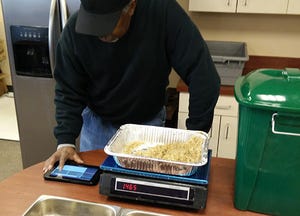Composting Council’s Partnership with Senior Hunger Group is a Win-Win
Digging into the complexities surrounding hunger among America’s seniors population enabled one Alexandria, Va.-based organization to unearth what it calls a “monster universe” of opportunity between those charged with feeding the elderly and the world of composting.
Enter the National Foundation to End Senior Hunger (NFESH). It’s entered into a new partnership with the U.S. Composting Council. The “What a Waste” initiative, announced earlier this month, will allow the two organizations to align their missions to put a fork in food waste and promote composting as an environmental solution that improves soil health and addresses senior hunger.
So how does composting Salisbury steak and mashed potatoes help end senior hunger?
First, consider this: More than one million meals are served daily by senior nutrition programs in the U.S. Then imagine the amount of food waste and scraps that are generated throughout that extensive, government-supported network. Factor in bad weather or that seniors can be a picky lot and heap in some plate waste from those who turn their noses up at broccoli or carrots.
“When we starting looking at the cost of food waste, we were looking at the dollars and cents cost, and there is a dollar cost,” says Matt Levine, chief operating officer at the National Foundation to End Senior Hunger, which is conducting a pilot program at three senior hunger sites in Washington, D.C. “If you can reduce your food waste by 50 percent as a nonprofit feeding site, you become more sustainable. But there are also environmental costs to your food waste and a way to be more green and bring that cost down is to compost.
“That nutrient- rich soil comes back to the senior center ultimately and seniors can grow healthy fruits and vegetables in senior-friendly gardens in soil that came from their food waste. That food can go to those in the community who need it the most. It sort of closes the loop on the project,” he says, adding that the What a Waste pilot progam has introduced waste reduction, composting and growing practices into the daily operations of nonprofit senior nutrition programs.

Dennis Robinson, staff member, Hattie Holmes Senior Wellness Center in Washington D.C.
“The seniors and the people in the senior centers are really receptive because they understand that they are part of something important,” he adds. “The seniors separate their food waste and they make sure it happens every day. They make sure the food doesn’t end up in the trash can.”
Besides being a neat story, the compost itself plays a starring role. That was the hook for the Bethesda, Md.-based Composting Council.
“It just made all the sense in the world to me,” says Al Rattie, interim executive director of U.S. Composting “Let’s look at it from the proverbial 20,000-ft, view: the residuals are generated; the residuals go to composting manufacturers; the composting is produced; the compost is either used or sold and then something grows; people consume the something and we’re back to the beginning of the circle again. The partnership with NFESH helps us complete that circle in a real tangible way.”
The next plan of action is to get a project or two off the ground and “put the theory into practice,” Rattie says.
“That’s step one,” he says. “It sounds very, very simple but you have to overlay that with permitting requirements across the country and find compost manufacturers. It’s a very highly regulated industry and it’s not that simple.”
NFESH’s partnership with the Composting Council is its strongest asset in trying to replicate this program and establish composting manufacturer partners around the country. The organization hopes to expand its What a Waste program to three states in 2015.
“We know from our research which states are doing better with senior hunger rates and which states are doing worse, so we’ll push harder to do this project in states where there is a higher percentage of senior hunger,” Levine said. “This project is working already, we know that. We also know that it is somewhat universal: we know that this will work pretty much anywhere we take it. It works in Washington, D.C., it’ll work in rural Virginia and it’ll work in Appalachia.”
About the Author
You May Also Like


.png?width=300&auto=webp&quality=80&disable=upscale)